|
This is my dynamic, frequently updated homepage. This is a NewsLog, also known as a WebLog or Blog.
Everything is evolving, so don't assume too much.
People to watch:
Adina Levin
Andrius Kulikauskas
Britt Blaser
Catherine Austin Fitts
Chris Corrigan
Clay Shirky
Dan Gillmor
Dave Pollard
David Allen
David Weinberger
Dewayne Mikkelson
Dina Mehta
Doc Searls
Elisabet Sahtouris
Elizabeth Lawley
Euan Semple
Florian Brody
Frank Patrick
Gen Kenai
George Dafermos
George Por
Graham Hancock
Greg Elin
Hazel Henderson
Heiner Benking
Inspector Lohman
Jean Houston
Jerry Michalski
Jim McGee
Jim Moore
John Abbe
John Perry Barlow
John Robb
Joi Ito
Jon Husband
Jon Lebkowsky
Jon Udell
Jonathan Peterson
Judith Meskill
Julian Elvé
Julie Solheim
Kevin Marks
Lawrence Lessig
Leif Smith
Letecia Layson
Lilia Efimova
Lisa Rein
Marc Canter
Mark Oeltjenbruns
Mark Pilgrim
Mark Woods
Martin Dugage
Martin Roell
Mary Forest
Matt Mower
Max Sandor
Michael Fagan
Mike Owens
Mikel Maron
Mitch Kapor
Mitch Ratcliffe
Nathalie dArbeloff
Netron
Noam Chomsky
Paul Hughes
Peter Kaminski
Phil Wolff
Philippe Beaudoin
Ray Ozzie
Raymond Powers
Rebecca Blood
Roger Eaton
Roland Tanglao
Ross Mayfield
Scott Lemon
Sebastian Fiedler
Sebastien Paquet
Skip Lancaster
Spike Hall
Steven Johnson
Stuart Henshall
Thomas Burg
Thomas Madsen-Mygdal
Thomas Nicholls
Timothy Wilken
Todd Suomela
Tom Atlee
Tom Munnecke
Tom Tomorrow
Ton Zijlstra
Lionel Bruel
Loic Le Meur
Nancy White
Mark Frazier
Merlin Silk
Robert Paterson
Colby Stuart
Nova Spivack
Dan Brickley
Ariane Kiss
Vanessa Miemis
Bernd Nurnberger
Sites to watch:
Edge
Junto
Absara
Rhizome
Nanodot
HeadMap
Openworld
FutureHi
Imaginify
Do No Harm
BoingBoing
Smart Mobs
Webcamorama
MetaFilter
NotThisBody
Disinfopedia
YES Magazine
Collective Web
WorldChanging
Disinformation
Escape Velocity
Space Collective
Friendly Favors
Emergent by Design
Independent Media
Global Ideas Bank
Forbidden Science
Greater Democracy
ThoughtsOnThinking
Disclosure Project
Explorers Foundation
Manufacturing Dissent
Collective Intelligence
Action without borders
Free Expression Network
Co-intelligence Institute
Electronic Frontier Foundation
French:
Emmanuelle
Manur
Elanceur
Loeil de Mouche
IokanaaN
Blog d'Or
Le Petit Calepin
GeeBlog
Absara
Guillaume Beuvelot
Ming Chau
Serge Levan
Jean Michel Billaut
C'est pas Mécanique

I live in Toulouse, France where the time now is:
01:06
Unique Readers:

Primarily
Public Domain
Everything I've written here is dedicated to the
Public Domain.

The quotes from other people's writings, and the pictures used might or might not be copyrighted, but are considered fair use. Thus, overall, this weblog could best be described as being:
Primarily Public Domain. |
Syndication:
 ![Validate my RSS feed [Valid RSS]](http://www.newciv.org/pic/valid-rss.png)
|
| Wednesday, January 29, 2003 |  |
|
|
|
 The first Israeli astronaut, Ilan Ramon, is having a good time in space. He said Wednesday from shuttle Columbia that he wishes his homeland — in fact, all of the Middle East — were as quiet and peaceful as it looks from space. The first Israeli astronaut, Ilan Ramon, is having a good time in space. He said Wednesday from shuttle Columbia that he wishes his homeland — in fact, all of the Middle East — were as quiet and peaceful as it looks from space."The world looks marvelous from up here, so peaceful, so wonderful and so fragile." Great. Maybe they should send up Ariel Sharon next time.
[ Inspiration | 2003-01-29 23:59 | | PermaLink ] More >
|
|
|
|
Guardian:Facing its most chronic shortage in oil stocks for 27 years, the US has this month turned to an unlikely source of help - Iraq.
Weeks before a prospective invasion of Iraq, the oil-rich state has doubled its exports of oil to America, helping US refineries cope with a debilitating strike in Venezuela. ...
The trade, though bizarre given current Pentagon plans to launch around 300 cruise missiles a day on Iraq, is legal under the terms of UN's oil for food programme. Eh, that's nice of Iraq to help out a bit. But I think bizarre is a bit of a euphemism.
[ Politics | 2003-01-29 23:59 | | PermaLink ] More >
|
|
|
|
Joi Ito (well-connected Japanese techie blogger) gets an e-mail from somebody looking for a Japanese tutor, because his weblog appeared in a search."One amazing phenomenon of blogs is that because of all of the linking going on they end up with fairly high google rankings. At Supernova, Cory of Boing Boing talked about how people email him asking about things he blogs because his blog entries show up on the top of Google results. Also at Supernova, Sergey Brin co-founder of Google talked about how important the ranking and results algorythms were for Google. For instance, first result for "suicide" can have a life or death impact on someone depending on whether it is a page to help you decide not to commit suicide or a page about how to commit suicide. I am the second entry for "Japan + Dayton Ohio" and #3 for "Takenaka media" for instance. At Davos, I talked to Larry Page, co-founder of Google about the phenomenon. I explained that I was very excited that my entry about how the media failed to report the public support of Takenaka showed up before the media reports. I mentioned that maybe it was the way blogs created a lot of pages and linked to each other a lot and how this was giving them unfair juice. Larry said he thought that blogs were getting higher rankings because they were becoming a more important part of the Internet and implied that he felt the high rankings were fair. Cool. I was beginning to feel a bit guilty about the high rankings and worried that Google would "figure it out" and start lowering the rankings for blogs. If Larry says they're fair, I'm assuming they're fair and I don't have to worry about a 'correction' in my page ranking." I'm glad to hear that too. Even though I'm a relatively low profile weblogger, hardly registering in the top 500, Google really likes my weblog, and many things I say here will appear very high, often higher than the news source that I quote. Which sometimes makes me a bit nervous.
[ Diary | 2003-01-29 23:59 | | PermaLink ] More >
|
|
|
|
 Blogging Event February 15th at the Electronic Orphanage in Chinatown, Los Angeles. It's a production of Rhizome.org, and features Doc Searls, Mark Frauenfelder, Heather Havrilesky, Evan Williams, Susannah Breslin, and Tony Pierce. Sounds great, I'll be there. Blogging Event February 15th at the Electronic Orphanage in Chinatown, Los Angeles. It's a production of Rhizome.org, and features Doc Searls, Mark Frauenfelder, Heather Havrilesky, Evan Williams, Susannah Breslin, and Tony Pierce. Sounds great, I'll be there.
[ Information | 2003-01-29 23:59 | | PermaLink ] More >
|
|
| Monday, January 27, 2003 |  |
|
|
|
 James Snell talks about being in control of one's own identity and storing it on one's own site, like as part of one's weblog: James Snell talks about being in control of one's own identity and storing it on one's own site, like as part of one's weblog:"A discussion on Sam's blog got me thinking about self-hosted identities. Ideally, I should be able to put together a file, discoverable through my weblog, and digitally signed with my private key that contains all of the personal information that I want to make public. When I go to any type of forum (like a weblog) or to a commercial site (like Amazon), if they want my information, they would do what Dave suggests and put a "You know me" button on their page. When I go to the site, I click on the button, the site asks me for the location of my identity file. They download the file and extract the necessary information." And he follows up here and here. We need that, of course. I'm tired of having entered my information on dozens of different sites over the years, and it being mostly outdated and forgotten. Much better that it is on my computer.
[ Knowledge | 2003-01-27 12:08 | | PermaLink ] More >
|
|
|
|
Michael Wilson lists a long list of techie program functions he's like on his computer, starting:A real-time ticker application that will be updated using RSS. (Not the current "refresh to update" silliness in aggregators of today)
Publishable schedule items (to the rest of the world or a specific subset at my option)
To subscribe to lists of events that are occurring around my area geographically, and virtually and have those events appear in a calendaring application.
To use a blog or blog-like publishing environment (I'm thinking Zope with CMF) for a personal desktop heads-up-display console from which I work at all times. and going on for a while. I think about lists like that too, and I'd like a number of the things he lists. Being a programmer makes one believe one can make things so they're exactly to your liking. And one can, when we're talking about how your information is organized. Unfortunately there are still not good enough tools to get me what I want without some heavy duty programming. Personally I hadn't had time to do most of it, so I'm suffering in some areas. I can easily think of things I'd want to be done differently about my e-mail storage, and it is a mess, but I haven't given it enough priority to go and program it myself, even though I know I could.
[ Knowledge | 2003-01-27 12:08 | 0 comments | PermaLink ]
|
|
|
|
From Herald Tribune article:West Europeans, generally speaking, do not share America's ambitions of vast global reform or visions of history coming to an end. They had enough of that kind of thinking, and its consequences, with Marxism and Nazism.
They are interested in a slow development of civilized and tolerant international relations, compromising on problems while avoiding catastrophes along the way. They have themselves only recently recovered from the catastrophes of the first and second world wars, when tens of millions of people were destroyed. They don't want more.
American commentators like to think that the "Jacksonian" frontier spirit equips America to dominate, reform and democratize other civilizations. They do not appreciate that America's indefatigable confidence comes largely from never having had anything very bad happen to it.
That's a good point. I come from a country that has existed for more than a thousand years and that has been in many wars, a country that was occupied by the Nazis while my mom was growing up, and people were being sent off to concentration camps. However terrible Vietnam was, it wasn't happening on American soil. However terrible 9-11 was, for most Americans it wasn't really something the country felt on its skin for long enough to grow wise from it. It was mainly something on TV that then got projected violently outwards. It could have been a transformative event that gave America a heart, and it was close, and it felt like it for a while, but it unfortunately ended up being taken in a different direction.
[ Politics | 2003-01-27 23:41 | | PermaLink ] More >
|
|
|
|
The Economist has an excellent article giving a balanced overview of the Israeli/Palestinian conflict, titled "It should have been so simple". Rather rare to see a well-balanced piece like that in a U.S. magazine. [Oops, I later realize it is a primarily U.K. magazine, but still]. It suggests the obvious, that the parties need to sensibly sort out how to share the land they reside in. And various road maps have been suggested along the way."But a map is not much good unless the Israelis and Palestinians can be prevailed upon to follow it. And this, gloomsters say, will not happen so long as the two old men, Mr Sharon and Mr Arafat, remain where they are. Mr Sharon is a disaster because he does not accept the central land-for-peace equation; Mr Arafat because he has lost control and drifts with the tide of events."
[ History | 2003-01-27 23:59 | | PermaLink ] More >
|
|
| Saturday, January 25, 2003 |  |
|
|
|
 Greater Democracy quotes an Independence Day Manifesto that Allen Ginsberg wrote in 1959. It begins: Greater Democracy quotes an Independence Day Manifesto that Allen Ginsberg wrote in 1959. It begins:"Recent history is the record of a vast conspiracy to impose one level of mechanical consciousness on mankind and exterminate all manifestations of that unique part of human sentience, identical in all men, which the individual shares with his Creator. The suppression of contemplative individuality is nearly complete.
The only immediate historical data that we can know and act on are those fed to our senses through systems of mass communication.
These media are exactly the places where the deepest and most personal sensitivities and confessions of reality are most prohibited, mocked, suppressed.
At the same time there is a crack in the mass consciousness of America -- sudden emergence of insight into a vast national subconscious netherworld filled with nerve gases, universal death bombs, malevolent bureaucracies, secret police systems, drugs that open the door to God, ships leaving Earth, unknown chemical terrors, evil dreams at hand.
Because systems of mass communication can communicate only officially acceptable levels of reality, no one can know the extent of the secret unconscious life. No one in America can know what will happen. No one is in real control. America is having a nervous breakdown... " [more] And, as David Weinberger poignantly comments:"Now we have new cracks in the broadcast stranglehold on what we know and what we count as interesting. We have one another, unmediated, through the Internet. The Internet should be America's nervous breakdown. And not a moment too soon." Yes, indeed. It is too late to put the genie back in the bottle, so it should indeed make somebody very nervous that we actually can sit here and share information at will, largely unrestrained. Some of us might even wake up and start thinking for ourselves.
[ Culture | 2003-01-25 23:01 | | PermaLink ] More >
|
|
|
|
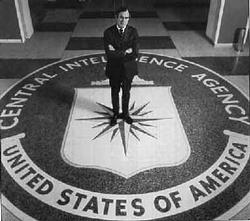 There is an intriguing and eye opening story to tell about a certain Bush family and how it was intimately involved in the financing of Nazi Germany, and how it made a huge windfall from this involvement. Read about it, for example, in The Dutch Connection. There is an intriguing and eye opening story to tell about a certain Bush family and how it was intimately involved in the financing of Nazi Germany, and how it made a huge windfall from this involvement. Read about it, for example, in The Dutch Connection."For the Bush family, it is a lingering nightmare. For their Nazi clients, the Dutch connection was the mother of all money laundering schemes. From 1945 until 1949, one of the lengthiest and, it now appears, most futile interrogations of a Nazi war crimes suspect began in the American Zone of Occupied Germany. Multibillionaire steel magnate Fritz Thyssen-the man whose steel combine was the cold heart of the Nazi war machine-talked and talked and talked to a joint US-UK interrogation team. For four long years, successive teams of inquisitors tried to break Thyssen's simple claim to possess neither foreign bank accounts nor interests in foreign corporations, no assets that might lead to the missing billions in assets of the Third Reich. The inquisitors failed utterly.
Why? Because what the wily Thyssen deposed was, in a sense, true. What the Allied investigators never understood was that they were not asking Thyssen the right question. Thyssen did not need any foreign bank accounts because his family secretly owned an entire chain of banks. He did not have to transfer his Nazi assets at the end of World War II, all he had to do was transfer the ownership documents - stocks, bonds, deeds and trusts--from his bank in Berlin through his bank in Holland to his American friends in New York City: Prescott Bush and Herbert Walker. Thyssen's partners in crime were the father and father-in-law of a future President of the United States...." ... and his son, who somehow also made it to president, with a little help from the family, and some of that nice money.
[ History | 2003-01-25 23:36 | | PermaLink ] More >
|
|
|
|
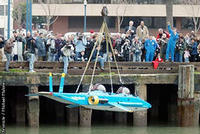 Yesterday there was a demonstration of an innovative personal submarine in the San Francisco Bay. It is meant to move through the water more like a glider or a jet than a traditional submarine. It is a homemade craft built by a local. Yesterday there was a demonstration of an innovative personal submarine in the San Francisco Bay. It is meant to move through the water more like a glider or a jet than a traditional submarine. It is a homemade craft built by a local.
[ Technology | 2003-01-25 23:52 | 0 comments | PermaLink ]
|
|
|
|
 If you'd rather commute to work through the air in a flying car, then you can bid on a prototype of the Moller SkyCar on eBay. I mentioned the SkyCar last here. It sounds very promising, but they're progressing somewhat cautiously. The model that will be for sale is potentially flyable, but has only been used for tethered test flights. They still hope for production within a few years, and the idea is that it could fit pretty much in a normal parking space, and it can take off vertically and fly at 300MPH, and it would be computer guided and very resilient to failures. They hope it would cost around $50K. If you'd rather commute to work through the air in a flying car, then you can bid on a prototype of the Moller SkyCar on eBay. I mentioned the SkyCar last here. It sounds very promising, but they're progressing somewhat cautiously. The model that will be for sale is potentially flyable, but has only been used for tethered test flights. They still hope for production within a few years, and the idea is that it could fit pretty much in a normal parking space, and it can take off vertically and fly at 300MPH, and it would be computer guided and very resilient to failures. They hope it would cost around $50K.
[ Technology | 2003-01-25 23:59 | | PermaLink ] More >
|
|
|
|
 A widespread worm infection in Internet-connected Microsoft SQL Server 2000 computers caused a major disruption of Internet connectivity last night. It brought down all the ATMs of my bank, Bank of America. Rather unnerving news that they use Microsoft Windows to manage my money. Luckily I don't have much. A widespread worm infection in Internet-connected Microsoft SQL Server 2000 computers caused a major disruption of Internet connectivity last night. It brought down all the ATMs of my bank, Bank of America. Rather unnerving news that they use Microsoft Windows to manage my money. Luckily I don't have much.
[ News | 2003-01-25 23:59 | | PermaLink ] More >
|
|
|
|
 Scientific American reports that scientists feel they've found an explanation to how stones manage to self-organize. In many polar and high alpine areas stones form strange circular patterns. Now they've identified how that might take place quite naturally through repeated freezing and thawing. Well, self organization IS the most natural thing in the world, whatever the medium. Scientific American reports that scientists feel they've found an explanation to how stones manage to self-organize. In many polar and high alpine areas stones form strange circular patterns. Now they've identified how that might take place quite naturally through repeated freezing and thawing. Well, self organization IS the most natural thing in the world, whatever the medium.
[ Nature | 2003-01-25 23:59 | 0 comments | PermaLink ]
|
|
| Friday, January 24, 2003 |  |
|
|
|
 For a while I called my weblog "Ming the Mechanic", because I somehow liked how it sounds. Some people said "Great name!", and others, like my family, said "Mechanic???". Well, I like mechanical stuff, but, really, hardware is something I have rather little talent with. I wouldn't know what to do if my car breaks down. And whenever I need to add memory or a harddisk to my computer, and I decide it is a good idea to do it myself, I tend to end up breaking something. No, I'm a different kind of mechanic. I have some success as a people mechanic, or a system mechanic. I like if people bring me something to fix, and I fix it. Particularly when it relates to individuals or groups of people trying to do something, and not quite succeeding. And I resonate with people with that kind of abilities. For a while I called my weblog "Ming the Mechanic", because I somehow liked how it sounds. Some people said "Great name!", and others, like my family, said "Mechanic???". Well, I like mechanical stuff, but, really, hardware is something I have rather little talent with. I wouldn't know what to do if my car breaks down. And whenever I need to add memory or a harddisk to my computer, and I decide it is a good idea to do it myself, I tend to end up breaking something. No, I'm a different kind of mechanic. I have some success as a people mechanic, or a system mechanic. I like if people bring me something to fix, and I fix it. Particularly when it relates to individuals or groups of people trying to do something, and not quite succeeding. And I resonate with people with that kind of abilities.
Several corporations I worked for used consultants for various purposes. Like, if the board of directors needed an outside opinion on things, they would bring in Coopers and Lybrand, or Andersen, or some big consulting company like that. Three or four people in suits would show up with briefcases, and they would create a thick report, saying basically what they had in mind saying before they came, and it would cost the company $50K or so. Nobody paid any attention to what they actually said in their report, but everybody were content with the whole thing, because nothing ever changed.
But in this one company, when they actually had a problem, and they didn't know what to do about something, they brought in another kind of consultant. It was this little old lady. Maybe she wasn't that old, but she was an unusual sight for a consultant. I don't remember her name, but let's say it was Heidi. They didn't care about her company name, it was just "Let's call Heidi". And she was fabulous - and very expensive. An extremely sharp and experienced person who would walk around and talk with everybody, and rather quickly figure out what actually was going on. She cared very little about the corporate jockeying-for-position, trying-to-look-good kind of thing. She just went straight for the facts, figured out what the scenario was, reported it to the CEO, and left. And things got fixed. I really liked her. I wouldn't mind being a person like that.
Another example, some would say a horrible choice, but it illustrates my point: In the movie Pulp Fiction, John Travolta and Samuel L. Jackson's characters get in some trouble. There's a dead body in the car, blood all over, they're at this guy's house, and his wife is coming home in an hour, and they don't know what to do. Their boss, the big gangster Marsellus Wallace decides it is time to call in Mr.Wolf. Mr.Wolf happens to be across town in a tuxedo at a party, having cocktails. But when he gets the phonecall, he's professionalism itself. He gets paid extremely well, but he is only used when it really counts. He's there in 10 minutes in his Porsche. "I'm Winston Wolf, I solve problems" he says. And so he does. All he really does is to take a keen look at what is going on, and to tell the people who're standing around what the logical thing to do is. And, well, I certainly don't have in mind working for gangsters, but I like the idea of being the person who's brought in to solve a problem, but who otherwise is happily uninvolved.
As to the Mechanic metaphor - a mechanic fixes things, by being knowledgable about how things work, by looking at what is going on, and by adjusting things so that they work. The Mechanic loses no sleep over what you do in-between the times when you need him, whether we're talking about a car or a person or a company.
[ Diary | 2003-01-24 23:50 | | PermaLink ] More >
|
|
|
|
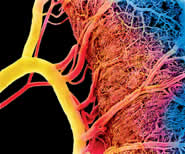 New Scientist reports that scientists have some success with using modified desktop printers to 'print' three-dimensional structures out of living cell tissue. Sounds crazy, but they say it is a step towards creating blood vessels or whole organs that way. Part of the magic comes from the observation that bits of tissue placed next to each other naturally will fuse together. So, if they're small enough, and close enough, they'll stick together. And ink-jet printers are about spewing out little blobs of stuff that are really close to each other. New Scientist reports that scientists have some success with using modified desktop printers to 'print' three-dimensional structures out of living cell tissue. Sounds crazy, but they say it is a step towards creating blood vessels or whole organs that way. Part of the magic comes from the observation that bits of tissue placed next to each other naturally will fuse together. So, if they're small enough, and close enough, they'll stick together. And ink-jet printers are about spewing out little blobs of stuff that are really close to each other.
[ Technology | 2003-01-24 23:59 | 0 comments | PermaLink ]
|
|
|
|
Brian Eno is a music genius who also happens to have intelligent things to say about the world. He is one of the ongoing supporters for the Institute for Social Inventions. He has a nice article in Time Magazine, about how it seems to him, as a European, that America is trapped in a fortress of arrogance and ignorance. I agree with him." Europeans have always looked at America with a mixture of fascination and puzzlement, and now, increasingly, disbelief. How is it that a country that prides itself on its economic success could have so many very poor people? How is it that a country so insistent on the rule of law should seek to exempt itself from international agreements? And how is it that the world's beacon of democracy can have elections dominated by wealthy special interest groups? For me, the question has become: 'How can a country that has produced so much cultural and economic wealth act so dumb?'"
[ Politics | 2003-01-24 23:59 | | PermaLink ] More >
|
|
|
|
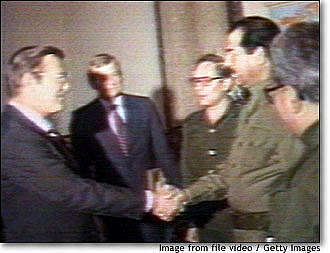 This is Donald Rumsfeld (now U.S. Secretary of Defense) meeting with Saddam Hussein December 20th, 1983. Iraq had a few months earlier started using chemical weapons, particularly mustard gas, on the battle field, which Rumsfeld knew very well. The U.S. was providing Iraq with significant financial and political support at the time. The purpose of the meeting was to express U.S. support for Iraq against Iran, and to make sure that U.S. oil interests weren't harmed. They were further negotiating about an oil pipeline from Iraq to the Jordanian port of Aqaba. Events in the war after the meeting seem to indicate that Saddam felt he had gotten a green light from Rumsfeld to proceed in stepping up the war and the use of chemical weapons, which was greatly expanded after the meeting. These events are mentioned in an article in the Herald Tribune by Joost R. Hiltermann, and are based on declassified documents from the State Department, specifically the notes from the meeting. Also remember that American and British companies have sold Iraq lots of chemical and nuclear hardware. This is Donald Rumsfeld (now U.S. Secretary of Defense) meeting with Saddam Hussein December 20th, 1983. Iraq had a few months earlier started using chemical weapons, particularly mustard gas, on the battle field, which Rumsfeld knew very well. The U.S. was providing Iraq with significant financial and political support at the time. The purpose of the meeting was to express U.S. support for Iraq against Iran, and to make sure that U.S. oil interests weren't harmed. They were further negotiating about an oil pipeline from Iraq to the Jordanian port of Aqaba. Events in the war after the meeting seem to indicate that Saddam felt he had gotten a green light from Rumsfeld to proceed in stepping up the war and the use of chemical weapons, which was greatly expanded after the meeting. These events are mentioned in an article in the Herald Tribune by Joost R. Hiltermann, and are based on declassified documents from the State Department, specifically the notes from the meeting. Also remember that American and British companies have sold Iraq lots of chemical and nuclear hardware.
[ History | 2003-01-24 23:59 | | PermaLink ] More >
|
|
| Thursday, January 23, 2003 |  |
|
|
|
 "Most everybody is overwhelmed. And they respond with various defense mechanisms. Denial, isolation, increased greed ('I'll get it while I can'), righteousness ('It's their own fault'). There are a whole set of mechanisms that people use to keep from being open, because the quality of the human heart uncontrolled by the mind is that it will give away everything... We have to find ways to exercise the compassion of our hearts, and at the same moment learn how to know what the limits are and be able to say no without guilt." -- Ram Dass Jon Husband mentioned that quote. Indeed, I think it is a well-kept secret that most people are overwhelmed by life at this point. It didn't used to be like that. The world has sped up. Things are accelerating. Most people can't really keep up. Sometimes I think that it is just me, and that the people around me are just standing around waiting for me to get my act together. Until I look a little deeper and realize that most people I know are so thoroughly busy keeping up with their own lives that they don't have much time to stand around and philosophize about what I am not getting done. Nobody seems to have any time left over after doing what they need to do. Because they're not done doing what they need to do.
Fundamentally I think it is a good and useful thing. An evolutionary trigger. See, if there isn't time enough to get everything done, you have to learn to prioritize and to be more discerning about what you do, and what not to do. And it is inevitably leading towards that you'll choose to do the things that you most feel you need to do, the essential stuff - what is most vital. And you'll choose to do what is exciting, rather than what is boring. I mean, if I can't do everything anyway, why on earth would I choose to do the boring stuff, and leave the exciting stuff undone.
But, when we're put under pressure, apparently being asked to do more things than what appears to be humanly possible, it brings up a whole bunch of feelings and reactions from the bottom of our psyche. We might temporarily escape the problem by coercing others into doing more things for us. We might put on blinders, and start ignoring a larger portion of life. We might deny it altogether, and pretend that our life is perfectly in order, all organized, relaxed and secure. We might hold on to the way things used to be.
Ultimately I think it is about learning to both be very open and flexible, and at the same time very discerning and precise. Be open to everything that the universe blows by your nose, but don't assume that you're supposed to analyze and package all of it. That's impossible. Just be open to it. You can watch the leaves blowing off the trees, and find it beautiful, without having to collect or count each single leaf.
There's plenty of time for that which is most essential. The time is always NOW, and there's never more or less of now. So, of course you have time enough for doing what you're doing right now. You just have to give up the idea that you SHOULD be doing something else than what you're doing. Do what you need to do. Don't do everything else.
[ Culture | 2003-01-23 18:12 | | PermaLink ] More >
|
|
|
|
According to New Scientist, American engineers in the Antarctic have begun work on a highway from the giant US coastal base at McMurdo Sound to the South Pole - a distance of 1600 kilometers. An initial purpose for the highway will be to help lay a $250-million fibre-optic cable to the Scott-Amundsen base. The Scott-Amundsen base is home to a growing amount of scientific equipment. But it is out of sight of most geostationary communications satellites, so it cannot reliably send back real-time data to the laboratories in the US that use the equipment. The cable would solve that problem.
[ Technology | 2003-01-23 23:45 | | PermaLink ] More >
|
|
|
|
New Scientist says that the port of Rotterdam is working on a system for docking ships using magnets. Apparently it would save a good deal of time, effort and money if one can just flick a switch to pull a ship into a secure position, rather than maneuvering around with ropes.
[ Technology | 2003-01-23 23:45 | 0 comments | PermaLink ]
|
|
|
|
 SpaceDaily has an article about technologies used by participants in the 2003 Paris-Dakar rally. Thermal screens under the car, cooling system in your helmet, self-cooling containers, and space-food to eat. SpaceDaily has an article about technologies used by participants in the 2003 Paris-Dakar rally. Thermal screens under the car, cooling system in your helmet, self-cooling containers, and space-food to eat.
[ Technology | 2003-01-23 23:45 | | PermaLink ] More >
|
|
|
|
Phil Wolff:Through the black, a flash of unexpected light. BART's Transbay Tube runs under the San Francisco Bay. Connecting Oakland to The City by tunneling through dark, deep brine. Your next time through, peer into the dark. Even at 70 miles per hour you may glimpse the phantom station mid-way through the eight mile submergence. No one's talking about it. Is it an abandoned construction site, peopled by the homeless? A cold war bunker? A cancelled connection to the old Treasure Island Navy base? An exclusive night club with an unbeatable underwater view? A biowar research lab, isolated for the next Andromeda strain? A deep sea diving platform, the better to find jumpers who preferred the Bay Bridge to the Golden Gate? An archaelogical site, continuing a 40 year investigation into an alien wreck uncovered by Bechtel during construction? The next time a BART train blows through your station without picking up passengers, remember this. It could be on the way to the mystery stop." I just love abandoned underground stuff.
[ Culture | 2003-01-23 23:45 | 0 comments | PermaLink ]
|
|
|
|
 James Carse makes some very interesting distinctions between what is a society and what is a culture in his book "Finite and Infinite Games" [which I mentioned here]. James Carse makes some very interesting distinctions between what is a society and what is a culture in his book "Finite and Infinite Games" [which I mentioned here]."In their own political engagements infinite players make a distinction between society and culture. Society they understand as the sum of those relations that are under some form of public constraint, culture as whatever we do with each other by undirected choice." Society consists of what people do because of necessity, because they HAVE to. Society is a finite game with certain rules that have to be adhered to. Society will perpetuate rules from the past and will resist any changing of the rules. Society has a lot to do with achieving and maintaining power, largely based on the games one has won in the past and the status one has achieved from that.
A society is bounded temporarily and spatially. There is a start and an end to a society, and it will defend its borders and its definition vehemently. Members of a society are only those who live within its boundaries and agree to the validity of its rules.
A culture, on the other hand, is not bounded. Anybody at any time anywhere can participate in a culture.
[ Patterns | 2003-01-23 23:45 | | PermaLink ] More >
|
|
| Wednesday, January 22, 2003 |  |
|
|
|
 So, do I want to categorize things when I store them, or do I just want flexible ways of searching for things later on? I'm talking about the filing system(s) in my life. My e-mail archive, my personal databases of things I need to remember. Until now my vision has been that a sufficiently multi-dimensional system could be devised where I could easily assign a piece of information to a number of different categories while I'm in the process of saving it, even being able to make up new classifications on the fly. And then, later, when I need to find the information again, it is already classified in a number of different useful ways, as many ways as I feel like, and chances are that one of them is what I need. By date, by location, by people involved, by subjects, by reference to other items, etc. So, do I want to categorize things when I store them, or do I just want flexible ways of searching for things later on? I'm talking about the filing system(s) in my life. My e-mail archive, my personal databases of things I need to remember. Until now my vision has been that a sufficiently multi-dimensional system could be devised where I could easily assign a piece of information to a number of different categories while I'm in the process of saving it, even being able to make up new classifications on the fly. And then, later, when I need to find the information again, it is already classified in a number of different useful ways, as many ways as I feel like, and chances are that one of them is what I need. By date, by location, by people involved, by subjects, by reference to other items, etc.
But the first problem is that no matter how easy the user interface is, I will quickly become tired of categorizing things. I'm already getting way too much e-mail, and even the job of going through it and deleting it, or filing it in even one folder is beginning to be too much work for me. So, would I really want to have to select from dozens of different pulldown lists whenever I file an e-mail? Probably not.
The second problem is that I don't know what my main categories of interest will be next year. I change often, and next year I mostly likely will have a list of new ways of categorizing things, which I couldn't think of now. But am I then going to go back and apply those categories to all my old information? No, I won't have time for that.
So, I must admit that what I really want is that when I need something, I will get it, in an organized, complete and sensible fashion. I want to say "Computer, give me a list of all the people I have sent e-mail last year!". And when I get the list, I want to say "Sort them in order of volume of mail", and then "Correlate the top 10% with the list of people who've called me on the phone". I want the freedom to make it up on the spot. And I don't want to have had to predict that query a year earlier. I don't want to have had to select a dozen pulldown menus on a screen whenever I get a phonecall. I just want to, at best, answer my phonecall.
What I need is apparently an AI that records everything that happens to me, and that is smart enough to be able to give me a complete list of relevant, cross-indexed information, whenever I desire it. Please.
[ Knowledge | 2003-01-22 23:59 | | PermaLink ] More >
|
|
|
|
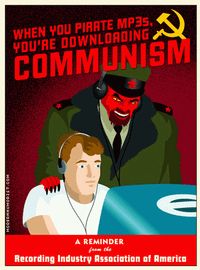 RIAA, the music industry's main organ, has been a lot in the press the past couple of years, because of their ongoing battle with ...just about anybody who wants to enjoy music in new and different ways, without paying them each time. Wired: RIAA, the music industry's main organ, has been a lot in the press the past couple of years, because of their ongoing battle with ...just about anybody who wants to enjoy music in new and different ways, without paying them each time. Wired:"There are a lot more voters downloading music than there are music company executives," Hayes warned. "If the RIAA was my client, I'd advise them to think this one through again." Wise words from an entertainment industry lawyer. But think about it for a moment. We all know, of course, that there are many more voters who would like to share music they like than there are music company executives who want to own all music in the world. And this is a democracy, no? Well, if it were, there wouldn't be any problem at all. If we each had one vote, no problem. But music industry executives can buy power and media coverage that is equivalent to millions of votes and millions of voices. That will probably still eventually put them in the minority, but only barely.
Hillary Rosen, CEO of the RIAA, 'The Most Hated Name in Music' as Wired put it, wants to force ISPs to pay her for the losses she thinks she's incurred from online piracy. Well, obviously she has MUCH more than one vote, since such a scammy scheme even will be taken seriously in the major media. It is taken seriously because she might very well have bought enough politicians to actually carry it through. Luckily she's stepping down at least.
And here's some other good news: British pop star Robbie Williams says that he thinks that music piracy is a great idea.
[ Politics | 2003-01-22 23:59 | | PermaLink ] More >
|
|
|
|
 21st Century Airships apparently has a contract to build replacements for cellphone towers for several US companies, in the form of balloons, permanently anchored up in the air. They're still working on developing 'High Altitude Platforms' which would be stationed even higher, in the stratosphere 18-21km above earth, to serve other telecommunications needs, and environmental monitoring. 21st Century Airships apparently has a contract to build replacements for cellphone towers for several US companies, in the form of balloons, permanently anchored up in the air. They're still working on developing 'High Altitude Platforms' which would be stationed even higher, in the stratosphere 18-21km above earth, to serve other telecommunications needs, and environmental monitoring.
[ Technology | 2003-01-22 23:59 | | PermaLink ] More >
|
|
|
|
The MoveOn organization has scored some good successes recently. Mark Smollin posts their announcement. Lately they've focused on a Let the Inspections Work campaign. 310,000 people signed the petition. Several dozen congressmen sent a letter to Bush, asking him also to let the inspectors work. Support for war has dropped sharply.
[ News | 2003-01-22 23:59 | 0 comments | PermaLink ]
|
|
| Tuesday, January 21, 2003 |  |
|
|
|
 Various management gurus, like Tom Peters, are talking about "The Brand called You". The idea is that the world and the job market are moving so quickly that you can no longer count on just getting a job and being safe from then on. Increasingly we are free agents who continuously need to market ourselves and forge new and changing commercial relationships, and to always create our own job. So, to that end, it is critical to be aware of what your brand is, what your selling points are, what your core competencies are, and to have your own rap, so you can quickly convey that to others. Various management gurus, like Tom Peters, are talking about "The Brand called You". The idea is that the world and the job market are moving so quickly that you can no longer count on just getting a job and being safe from then on. Increasingly we are free agents who continuously need to market ourselves and forge new and changing commercial relationships, and to always create our own job. So, to that end, it is critical to be aware of what your brand is, what your selling points are, what your core competencies are, and to have your own rap, so you can quickly convey that to others.
I also get to think about a workshop/program I did, called IBI - Income Builders International - which is a weeklong, very expensive, but rather effective program that in part helps you find what your own personal WOW is, and trains you to present your "thing" in a compelling way in 30 seconds. And all of that is good. I'd really like all of us to be really clear on what our THING is, our WOW, the thing we're here to do, and which we're passionate about. And I think something will click if we are also able to present it clearly and simply, as we then can forge economic relationships more easily.
But now, my own problem is, unfortunately, that at this point I can't really tell you what my own core competency is. I am quite capable in several, rather diverse areas, but I can't tell you in 30 seconds what I do, without making you confused. The kind of stuff I usually would feel like putting on my business card would tend to make people look puzzled and ask "How on earth would you make money on that?". My current business card says "Linking the people who change the world". Sounds good, and I get a certain amount of admiration for that, but nobody's gonna hire me to actually do that.
I'm a computer programmer, a skilled and experienced one. But that is not really what I want to be to the world. I'm getting too old for that, and I don't want to spend all day thinking about logical problems.
I'm a personal counselor and the author of two manuals/books about counseling techniques, and I've seen a lot of success in that area. Yet I only see a couple of clients per week at this point, and it is not my main focus of attention.
I used to be somebody people would come to to have things explained, to make complicated things simple. A philosopher who had the answer to just about anything, including the big questions of life. Nobody comes and asks me anything any longer, so I don't think that's it.
I seem to have a certain knack for gathering people together, and inspiring people. But most of the time I don't know what to do with them once I've gathered or inspired them, and I'm not great at leading and delegating focused work.
I'm obviously a writer, as one of the things that flows most easily would be to write something like this weblog here. I can probably do that in my sleep, even if the world is falling down around me. But I'm no good at writing other people's stuff. I can't write ordered articles on a schedule.
There are more roles I have - networker, event organizer, actor, creative person, evolutionary agent, healer, solver of problems, diplomat, futurist, designer of new systems for people to organize in - but this could easily get long. And it doesn't really add up. I don't mind being multi-dimensional, but I'd still like to be able to be clear on what I am, and where my services are needed, and how I can present myself.
So, please, if any of you happen to know, tell me what my brand is.
[ Diary | 2003-01-21 18:33 | | PermaLink ] More >
|
|
|
|
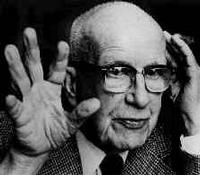 "I live on Earth at present,
and I don't know what I am.
I know that I am not a category.
I am not a thing -- a noun.
I seem to be a verb,
an evolutionary process --
an integral function of the universe."
-- R. Buckminster Fuller
[ Inspiration | 2003-01-21 23:59 | | PermaLink ] More >
|
|
|
|
Agence France-Presse has a new news service in English called the "Global Ethics Monitor" which carries Corporate Responsibility News every day. I.e. mostly news about large corporations doing bad things and being caught in the act. Now, THAT's good news. I don't think you are going to see such a thing from any major U.S. news agency anytime in the near future.
[ News | 2003-01-21 23:59 | | PermaLink ] More >
|
|
| Monday, January 20, 2003 |  |
|
|
|
 Charles Miller: Charles Miller:"I no longer want to know where my files are stored. I no longer care. I have hordes of directories on my various computers called stuff, downloads and documents, and the effort that it would take to organise them into a proper heirarchy is just not worth it. The heirarchical filesystem is a really wonderful thing for programmers and websites, but it just doesn't cut it for personal use. I no longer care where my files are stored." Leslie Michael Orchard:"I'll be burned at the next stake over from Charles when the time comes, for this filesystem heresy. Just the other night, a co-worker was asking me about how diligent I was in organizing my email. I told her, "Not at all. I leave it all in one pile and then run the Find command on it later." She was shocked that I, alpha geek and info freako, didn't have some intricate taxonomy of folders into which mail was sorted by carefully crafted filters.
Here's what I want to see: Storage without explicit organization, but with super-rich metadata for super-fast searches. Allow me to create views made from persistent searches - my "project folder" is simply a collection of resources tied together by a common tag, one of many. And, if I want to form a project hierarchy, make my persistent searches into file objects too. The main thing in all this, though, is that it be woven very deeply within the OS. I don't want a helper app. I want this to replace the standard metaphor completely." Yep, I think that's what I want too. The thing is that the world we live in is no longer hierarchical. Any piece of information fits into a bunch of different structures in different ways, depending on what I'm trying to do. If I go and drop the item in a file in a folder in a filing cabinet, in the place that seems logical at the time, chances are I won't find it next time I'm looking for it. So, yes, maybe there is no good way of easily storing it multi-dimensionally. Maybe the best is to store some concise information about the information (which is called metadata), such as date, person, relations to projects, interests, etc. and then leave it up to an efficient search engine to find things by those keys later on.
[ Knowledge | 2003-01-20 15:43 | | PermaLink ] More >
|
|
|
|
 I wrote these two books on "Transformational Processing", which is the counseling system I use when working with clients. Being a personal counselor is one of the several hats I'm wearing. Now, I'm getting quite a few inquiries about this, in part because the books are freely downloadable on the net. Particularly I often get inquiries and success stories from former east bloc countries, like here today, from Bulgaria: I wrote these two books on "Transformational Processing", which is the counseling system I use when working with clients. Being a personal counselor is one of the several hats I'm wearing. Now, I'm getting quite a few inquiries about this, in part because the books are freely downloadable on the net. Particularly I often get inquiries and success stories from former east bloc countries, like here today, from Bulgaria:"Hello, m-r Funch!
I founded your books "Dialogues" and "Paths" in the internet in Russian language and I am very enthusiastic about the transformational processing.
Since 15 years I have read and made technics from Kastaneda, Osho, east religion, meditations etc. But I went on my road slow and blind.
For a few months with the help of the processing I made a great jump in my self improvement. I found many prickles in my self and took them out. I feel that I am making a progress for 10 lifes forward.
Thank you very much!
And I want to ask you-how can I work with the processing in my country? I already work with a few friends and we see a real progress in everybody.
But here there is no traditions, no even a psychotherapy has a tradition. But I think that all bulgarian people have a need for processing. The people say that we have many extrasenses, witches etc because we are very sensitive nation. But I think that we have such kind of people, because we don't have psychoterapists. And facilitators.
Can you give me some advice?
Excuse me for my English, please!
Nataly" I think there's maybe a basis for me traveling around and doing workshops in those areas. I haven't really decided to go for it yet, but that could be a new adventure.
[ Diary | 2003-01-20 16:00 | 0 comments | PermaLink ]
|
|
|
|
 HeadMap is a site, a magazine and a collective focusing on examining the social implications and applications of location aware devices. Cool, cool things. You know, along the lines of wearable computers that know where you are, and that know things about the local environment, and that can connect you with others who are around. HeadMap is a site, a magazine and a collective focusing on examining the social implications and applications of location aware devices. Cool, cool things. You know, along the lines of wearable computers that know where you are, and that know things about the local environment, and that can connect you with others who are around.there are notes in boxes that are empty
every room has an accessible history
every place has emotional attachments you can open and save
you can search for sadness in new york
people within a mile of each other who have never met stop what they are doing and organise spontaneously to help with some task or other.
in a strange town you knock on the door of someone you don’t know and they give you sandwiches.
paths compete to offer themselves to you
life flows into inanimate objects
the trees hum advertising jingles
everything in the world, animate and inanimate, abstract and concrete, has thoughts attached
[ Technology | 2003-01-20 19:10 | | PermaLink ] More >
|
|
|
|
 I have a strong agreement with Buckminster Fuller who said things like: I have a strong agreement with Buckminster Fuller who said things like:"The things to do are the things that need doing - that YOU see need to be done,
and that noone else seems to see need to be done." You know, I have the belief that every one of us is here to do something unique. It is not necessarily pre-destined or pre-determined what exactly it is. Probably rather something to discover or invent. But if we don't do something unique, if we don't add our unique perspective and sensibilities to the global soup of life, our life is somewhat wasted and meaningless. It doesn't have to be huge earth shattering things. It might be just a slightly different angle on things, which we impart to the people around us. Something we're present for, which nobody else paid any attention to. But there is for sure something that you can dream, something you can see, and something you can do, which nobody else has quite the same opportunity for. Bucky also says:"I look for what needs to be done.... After all, that’s how the universe designs itself." Life might seem meaningless unless you realize that you have an important role in co-designing the continued evolution of the universe. There are lots of things to do, so it would be silly to have a meaningless life.
[ Inspiration | 2003-01-20 19:45 | | PermaLink ] More >
|
|
| Sunday, January 19, 2003 |  |
|
|
|
Lawrence Lessig has a new proposal which possibly might be more likely to fly:"Here is something you can do right now. In this NYT op-ed, I describe a proposal that would move more work into the public domain than a total victory in the Supreme Court would have. The basic idea is this: 50 years after a work has been 'published', a copyright owner would be required to pay a copyright tax. That tax should be extremely low--this proposal says $50, but it could be $1. If the copyright holder does not pay the tax for 3 years, then the work is forfeit to the public domain. If the copyright holder does pay the tax, then its contacting agent would be made a matter of public record. Very quickly we would have a cheap, searchable record, of what work is controlled and what work is free." I think the point is that the compromise would allow corporations to hold on to the 'properties' they truly are doing something with, while the rest, maybe 98% would end up in the public domain, to the pleasure of the general public. Only problem I see is that if the 'tax' is too minimal, the big media companies would most likely choose to pay it on everything, just to hold on to it. There is also a FAQ .
[ Politics | 2003-01-19 23:59 | | PermaLink ] More >
|
|
|
|
Engineers at BASF present some promising new uses of nanotechnology that appear to be just around the corner. Toothpaste that actually rebuilds the enamel on your teeth, shoes that dirt just can't stick to, and batteries as sponges for hydrogen.
[ Technology | 2003-01-19 23:59 | 0 comments | PermaLink ]
|
|
| Saturday, January 18, 2003 |  |
|
|
|
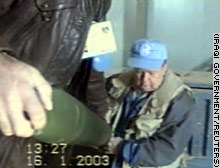 The mainstream U.S. news has been reporting that inspectors have found undeclared chemical warheads in Iraq, and it has been made to sound like "Aha, they lied, they had chemical warheads hidden, hoping we wouldn't find them". What they found were some old boxes, from the 1980s, covered with birdshit, that had never been opened, and which contained empty artillery shells. That is first of all within what is allowed for Iraq, and secondly, they were empty. Meaning, they could get filled with chocolate pudding or with explosives or with chemicals, but they weren't. At the bottom is a detailed response to the story, from somebody who knows what they're talking about. The mainstream U.S. news has been reporting that inspectors have found undeclared chemical warheads in Iraq, and it has been made to sound like "Aha, they lied, they had chemical warheads hidden, hoping we wouldn't find them". What they found were some old boxes, from the 1980s, covered with birdshit, that had never been opened, and which contained empty artillery shells. That is first of all within what is allowed for Iraq, and secondly, they were empty. Meaning, they could get filled with chocolate pudding or with explosives or with chemicals, but they weren't. At the bottom is a detailed response to the story, from somebody who knows what they're talking about.
And now the news is that the inspectors have found 3000 pages of information related to making nuclear weapons at the home of a top nuclear scientist, and those hadn't been listed in the official declaration. And they turn out to be old notes about an attempt to use lasers for isotope isolation, which project was abandoned in 1987.
There is a pattern there, which is obviously intended towards finding Iraq in violation of *something*, whether it is really of importance or not. It is a clever and effective pattern to use to do somebody in. The scheme is simply to make complex demands of what the country is supposed to declare, and when and how, and then, the moment they're a little late, or they forgot something somewhere, or they didn't do it exactly right, they can be shown to be in violation. It's a great plan. A country-wide bureaucracy will never be able to make a full and acurate inventory of everything they have anywhere. Particularly not a corrupt dictatorship of a country, who's infrastructure has already been destroyed several times. Are they going to remember all the places they stored some boxes of artillery shells? No. I'm sure, if you asked the U.S. military to do an inventory, they would forget hundreds of thousands of tons of deadly stuff, underground facilities, whole bases, missiles, submarines and who knows what, just because they can't keep track of it.
According to the same principle, you could go and methodically investigate the home of just about anybody in a typical western country, like me or one of my neighbors. And you would, I'd guess in at least 50% of the cases, find material enough to brand people as criminals, perverts, drug addicts, tax evaders, or whatever you happen to be looking for. If you don't really add things up in context, it is very easy to destroy the reputation of even the best of people. And for a screwed up country like Iraq, run by a crazy dictator, they're having a remarkably hard time doing the same thing.
[ Politics | 2003-01-18 18:12 | | PermaLink ] More >
|
|
|
|
 Tens of thousands of people protested yesterday in Washington D.C., San Francisco, and across the world in Europe and Asia. The good news is that this time the U.S. media didn't try to ignore it like the last time, and didn't lie about the numbers of attendees, as far as I can understand. Tens of thousands of people protested yesterday in Washington D.C., San Francisco, and across the world in Europe and Asia. The good news is that this time the U.S. media didn't try to ignore it like the last time, and didn't lie about the numbers of attendees, as far as I can understand.
[ News | 2003-01-18 18:29 | | PermaLink ] More >
|
|
|
|
Some of the laws of the U.S. state of Virginia are causing a bit of trouble for judges in the state, according to this article. See, Virginia law bans sodomy - "crimes against nature" - which includes oral or anal sex. Yeah, this is a crazy country. I think they should go and enforce it in the Pentagon and the CIA, and for any congress people who live in Virginia. Have a blowjob, go to jail. I think they should be the first to demonstrate what a good idea that is.
[ Politics | 2003-01-18 18:47 | | PermaLink ] More >
|
|
|
|

Steet Sensation shows contiguous photos of shops and bars and restaurants on a bunch of the busiest streets in London. Seamless City in San Francisco does it apparently even better, with a 30 mile seamless path of photos. It would be interesting if that kind of thing were easily accessible online, for many different cities, so that you can do a virtual tour of different areas. Would be even better if it were live, of course.
[ Technology | 2003-01-18 21:40 | 0 comments | PermaLink ]
|
|
|
|

They have other people to play the soldier part.
[ Politics | 2003-01-18 23:59 | 0 comments | PermaLink ]
|
|
<< Newer stories Page: 1 ... 71 72 73 74 75 ... 97 Older stories >> |
|

This is a collage of things that catch my eye, things that need to be said, and stuff I really care about
TRUTH
BEAUTY
FREEDOM
LOVE
TECHNOLOGY
|
| Mon | Tue | Wed | Thu | Fri | Sat | Sun |
|---|
|
|
|
|
|
|
1 |
| 2 |
3 |
4 |
5 |
6 |
7 |
8 |
| 9 |
10 |
11 |
12 |
13 |
14 |
15 |
| 16 |
17 |
18 |
19 |
20 |
21 |
22 |
| 23 |
24 |
25 |
26 |
27 |
28 |
|
|




